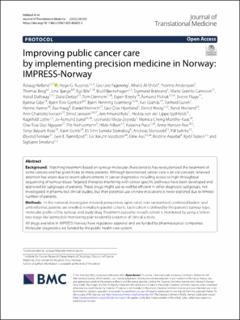Improving public cancer care by implementing precision medicine in Norway: IMPRESS-Norway
Helland, Åslaug; Russnes, Hege Elisabeth Giercksky; Fagereng, Gro Live; Al-Shibli, Khalid Ibrahim; Andersson, Yvonne; Berg, Thomas; Bjørge, Line; Blix, Egil Støre; Bjerkehagen, Bodil; Brabrand, Sigmund; CAMERON, MARTE; Dalhaug, Astrid; Dietzel, Dalia; Dønnem, Tom; Enerly, Espen; Flobak, Åsmund; Fluge, Sverre; Gilje, Bjørnar; Gjertsen, Bjørn Tore; Grønberg, Bjørn Henning; Grønås, Kari; Guren, Tormod Kyrre; Hamre, Hanne Mari; Haug, Åse; Heinrich, Daniel; Hjortland, Geir Olav; Hovig, Eivind; Hovland, Randi; Iversen, Ann-Charlotte; Janssen, Emiel; Kyte, Jon A; Gythfeldt, Hedda; Lothe, Ragnhild Adelheid; Lund, Jo-Åsmund; Meza, Leonardo Zepeda; Munthe-Kaas, Monica Cheng; Nguyen, Olav Toai Duc; Niehusmann, Pitt; Nilsen, Hilde; Puco, Katarina; Ree, Anne Hansen; Riste, Tonje Bøyum; Semb, Karin; Steinskog, Eli Sihn Samdal; Stensvold, Andreas; Suhrke, Pål; Tennøe, Øyvind Krohn; Tjønnfjord, Geir Erland; Vassbotn, Liv Jorunn; Aas, Eline; Aasebø, Kristine Øverås; Tasken, Kjetil; Smeland, Sigbjørn
Peer reviewed, Journal article
Published version
Permanent lenke
https://hdl.handle.net/11250/3059138Utgivelsesdato
2022Metadata
Vis full innførselSamlinger
Originalversjon
Helland, Å., Russnes, H. G., Fagereng, G. L., Al-Shibli, K., Andersson, Y., Berg, T., ... & Smeland, S. (2022). Improving public cancer care by implementing precision medicine in Norway: IMPRESS-Norway. Journal of translational medicine, 20(1), 1-11. 10.1186/s12967-022-03432-5Sammendrag
Background
Matching treatment based on tumour molecular characteristics has revolutionized the treatment of some cancers and has given hope to many patients. Although personalized cancer care is an old concept, renewed attention has arisen due to recent advancements in cancer diagnostics including access to high-throughput sequencing of tumour tissue. Targeted therapies interfering with cancer specific pathways have been developed and approved for subgroups of patients. These drugs might just as well be efficient in other diagnostic subgroups, not investigated in pharma-led clinical studies, but their potential use on new indications is never explored due to limited number of patients.
Methods
In this national, investigator-initiated, prospective, open-label, non-randomized combined basket- and umbrella-trial, patients are enrolled in multiple parallel cohorts. Each cohort is defined by the patient’s tumour type, molecular profile of the tumour, and study drug. Treatment outcome in each cohort is monitored by using a Simon two-stage-like ‘admissible’ monitoring plan to identify evidence of clinical activity.
All drugs available in IMPRESS-Norway have regulatory approval and are funded by pharmaceutical companies. Molecular diagnostics are funded by the public health care system.
Discussion
Precision oncology means to stratify treatment based on specific patient characteristics and the molecular profile of the tumor. Use of targeted drugs is currently restricted to specific biomarker-defined subgroups of patients according to their market authorization. However, other cancer patients might also benefit of treatment with these drugs if the same biomarker is present. The emerging technologies in molecular diagnostics are now being implemented in Norway and it is publicly reimbursed, thus more cancer patients will have a more comprehensive genomic profiling of their tumour. Patients with actionable genomic alterations in their tumour may have the possibility to try precision cancer drugs through IMPRESS-Norway, if standard treatment is no longer an option, and the drugs are available in the study. This might benefit some patients. In addition, it is a good example of a public–private collaboration to establish a national infrastructure for precision oncology.

